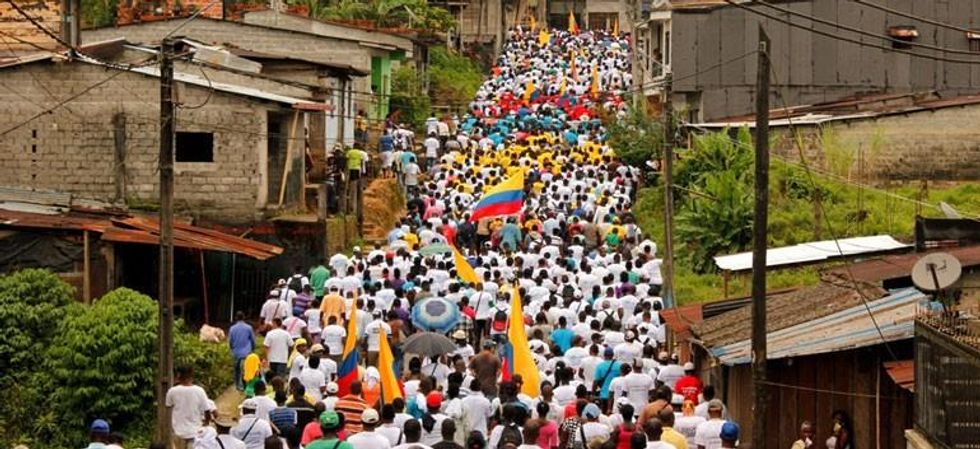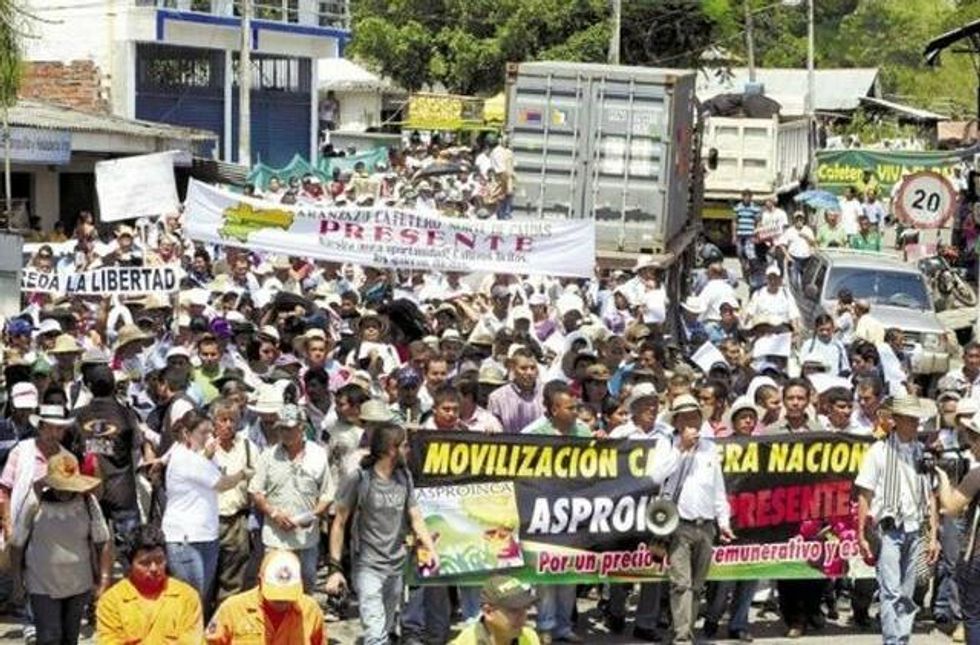

SUBSCRIBE TO OUR FREE NEWSLETTER
Daily news & progressive opinion—funded by the people, not the corporations—delivered straight to your inbox.
5
#000000
#FFFFFF
To donate by check, phone, or other method, see our More Ways to Give page.


Daily news & progressive opinion—funded by the people, not the corporations—delivered straight to your inbox.

"[The strike is a condemnation] of the situation in which the Santos administration has put the country, as a consequence of its terrible, anti-union and dissatisfactory policies," declared the Central Unitaria de Trabajadores (CUT), the country's largest union, in a statement.
The protests and strikes, largely ignored in the English-language media, have been met with heavy crackdown from Colombia's feared police, with human rights organization Bayaca reporting shootings, torture, sexual assault, severe tear-gassing, arbitrary arrests, and other abuses on the part of state agents. Colombia's Defense Minister Juan Carlos Pinzon recently claimed that the striking workers are being controlled by the "terrorist" Revolutionary Armed Forces of Colombia (FARC), in a country known for using unverified claims of FARC connections as an excuse to launch severe violence against social movements.
"Violent clashes continue in rural areas where farmers and truck drivers have been setting up roadblocks since Monday, and the Santos administration has deployed 16,000 additional military personnel to 'control the situation,'" Neil Martin of the Colombia-based labor solidarity organization Paso International told Common Dreams Sunday. "There have not been deaths reported in relation to this violence, but human rights organizations and YouTube videos have documented military personnel beating protestors, stealing supplies, carrying out vandalism unwarranted arrests, and generally inciting violence."
Protesters are levying a broad range of concerns about public policies that devastate Colombia's workers, indigenous, and Afro-Colombian communities. The US-Colombia Free Trade Agreement has forced small farmers to compete with subsidized US products, made them more vulnerable to market fluctuations, and eroded their protections and social safety nets through the implementation of neoliberal policies domestically. Farmers are demanding more protections and services in a country beset with severe rural poverty.
Meanwhile, the Colombian government is handing out sweetheart deals to international mining companies while creating bans and roadblocks for Colombian miners. Likewise, the government is giving multinational food corporations access to land earmarked for poor Colombians. Healthcare workers are fighting a broad range of reforms aimed at gutting and privatizing Colombia's healthcare system. Truckers are demanding an end to low wages and high gas prices.
"This is the third or fourth large-scale non-military rural uprising this year," Martin told Common Dreams.
Colombian workers organizing to improve their lives are met with an onslaught of state violence: Colombia is the deadliest country in the world for union activists, according to the AFL-CIO Solidarity Center, and 37 activists were murdered in Colombia in the 1st half of 2013 alone, leading news weekly Semana reports.
Santos, who says he refuses to negotiate while the strikes are taking place, has so far been unsuccessful in his efforts to quell the swelling protests that are paralyzing much of the country, particularly in rural areas.
"[W]e just want solutions to our problems," Javier Correa Velez, the head of a coffee-growers association called Dignidad Cafetera, told the Miami Herald. "The strike is simply a symptom of an illness that the entire agriculture sector is suffering from."

_____________________
Dear Common Dreams reader, The U.S. is on a fast track to authoritarianism like nothing I've ever seen. Meanwhile, corporate news outlets are utterly capitulating to Trump, twisting their coverage to avoid drawing his ire while lining up to stuff cash in his pockets. That's why I believe that Common Dreams is doing the best and most consequential reporting that we've ever done. Our small but mighty team is a progressive reporting powerhouse, covering the news every day that the corporate media never will. Our mission has always been simple: To inform. To inspire. And to ignite change for the common good. Now here's the key piece that I want all our readers to understand: None of this would be possible without your financial support. That's not just some fundraising cliche. It's the absolute and literal truth. We don't accept corporate advertising and never will. We don't have a paywall because we don't think people should be blocked from critical news based on their ability to pay. Everything we do is funded by the donations of readers like you. Will you donate now to help power the nonprofit, independent reporting of Common Dreams? Thank you for being a vital member of our community. Together, we can keep independent journalism alive when it’s needed most. - Craig Brown, Co-founder |

"[The strike is a condemnation] of the situation in which the Santos administration has put the country, as a consequence of its terrible, anti-union and dissatisfactory policies," declared the Central Unitaria de Trabajadores (CUT), the country's largest union, in a statement.
The protests and strikes, largely ignored in the English-language media, have been met with heavy crackdown from Colombia's feared police, with human rights organization Bayaca reporting shootings, torture, sexual assault, severe tear-gassing, arbitrary arrests, and other abuses on the part of state agents. Colombia's Defense Minister Juan Carlos Pinzon recently claimed that the striking workers are being controlled by the "terrorist" Revolutionary Armed Forces of Colombia (FARC), in a country known for using unverified claims of FARC connections as an excuse to launch severe violence against social movements.
"Violent clashes continue in rural areas where farmers and truck drivers have been setting up roadblocks since Monday, and the Santos administration has deployed 16,000 additional military personnel to 'control the situation,'" Neil Martin of the Colombia-based labor solidarity organization Paso International told Common Dreams Sunday. "There have not been deaths reported in relation to this violence, but human rights organizations and YouTube videos have documented military personnel beating protestors, stealing supplies, carrying out vandalism unwarranted arrests, and generally inciting violence."
Protesters are levying a broad range of concerns about public policies that devastate Colombia's workers, indigenous, and Afro-Colombian communities. The US-Colombia Free Trade Agreement has forced small farmers to compete with subsidized US products, made them more vulnerable to market fluctuations, and eroded their protections and social safety nets through the implementation of neoliberal policies domestically. Farmers are demanding more protections and services in a country beset with severe rural poverty.
Meanwhile, the Colombian government is handing out sweetheart deals to international mining companies while creating bans and roadblocks for Colombian miners. Likewise, the government is giving multinational food corporations access to land earmarked for poor Colombians. Healthcare workers are fighting a broad range of reforms aimed at gutting and privatizing Colombia's healthcare system. Truckers are demanding an end to low wages and high gas prices.
"This is the third or fourth large-scale non-military rural uprising this year," Martin told Common Dreams.
Colombian workers organizing to improve their lives are met with an onslaught of state violence: Colombia is the deadliest country in the world for union activists, according to the AFL-CIO Solidarity Center, and 37 activists were murdered in Colombia in the 1st half of 2013 alone, leading news weekly Semana reports.
Santos, who says he refuses to negotiate while the strikes are taking place, has so far been unsuccessful in his efforts to quell the swelling protests that are paralyzing much of the country, particularly in rural areas.
"[W]e just want solutions to our problems," Javier Correa Velez, the head of a coffee-growers association called Dignidad Cafetera, told the Miami Herald. "The strike is simply a symptom of an illness that the entire agriculture sector is suffering from."

_____________________

"[The strike is a condemnation] of the situation in which the Santos administration has put the country, as a consequence of its terrible, anti-union and dissatisfactory policies," declared the Central Unitaria de Trabajadores (CUT), the country's largest union, in a statement.
The protests and strikes, largely ignored in the English-language media, have been met with heavy crackdown from Colombia's feared police, with human rights organization Bayaca reporting shootings, torture, sexual assault, severe tear-gassing, arbitrary arrests, and other abuses on the part of state agents. Colombia's Defense Minister Juan Carlos Pinzon recently claimed that the striking workers are being controlled by the "terrorist" Revolutionary Armed Forces of Colombia (FARC), in a country known for using unverified claims of FARC connections as an excuse to launch severe violence against social movements.
"Violent clashes continue in rural areas where farmers and truck drivers have been setting up roadblocks since Monday, and the Santos administration has deployed 16,000 additional military personnel to 'control the situation,'" Neil Martin of the Colombia-based labor solidarity organization Paso International told Common Dreams Sunday. "There have not been deaths reported in relation to this violence, but human rights organizations and YouTube videos have documented military personnel beating protestors, stealing supplies, carrying out vandalism unwarranted arrests, and generally inciting violence."
Protesters are levying a broad range of concerns about public policies that devastate Colombia's workers, indigenous, and Afro-Colombian communities. The US-Colombia Free Trade Agreement has forced small farmers to compete with subsidized US products, made them more vulnerable to market fluctuations, and eroded their protections and social safety nets through the implementation of neoliberal policies domestically. Farmers are demanding more protections and services in a country beset with severe rural poverty.
Meanwhile, the Colombian government is handing out sweetheart deals to international mining companies while creating bans and roadblocks for Colombian miners. Likewise, the government is giving multinational food corporations access to land earmarked for poor Colombians. Healthcare workers are fighting a broad range of reforms aimed at gutting and privatizing Colombia's healthcare system. Truckers are demanding an end to low wages and high gas prices.
"This is the third or fourth large-scale non-military rural uprising this year," Martin told Common Dreams.
Colombian workers organizing to improve their lives are met with an onslaught of state violence: Colombia is the deadliest country in the world for union activists, according to the AFL-CIO Solidarity Center, and 37 activists were murdered in Colombia in the 1st half of 2013 alone, leading news weekly Semana reports.
Santos, who says he refuses to negotiate while the strikes are taking place, has so far been unsuccessful in his efforts to quell the swelling protests that are paralyzing much of the country, particularly in rural areas.
"[W]e just want solutions to our problems," Javier Correa Velez, the head of a coffee-growers association called Dignidad Cafetera, told the Miami Herald. "The strike is simply a symptom of an illness that the entire agriculture sector is suffering from."

_____________________